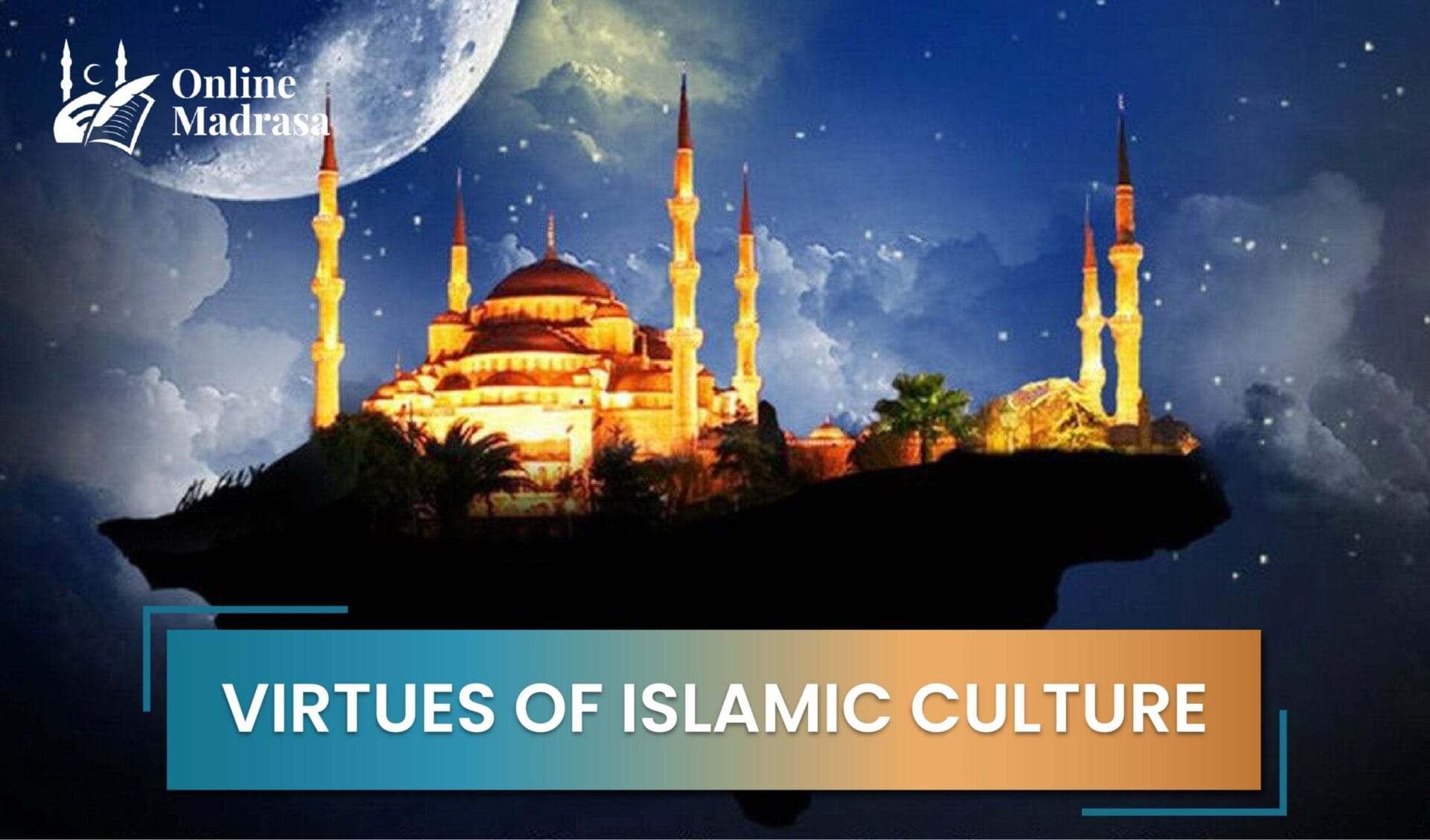Virtues of Islamic Culture

Islamic Culture
Islamic culture is all about the growth of the abilities of Muslims, their behavior, and their utterance towards their environment. The culture of Islam always reflects the values of Islam as Islam does not allow its followers to do anything that is against the dignity of another human being. Nor does it allow anything that is against human development. So, Muslims mold themselves according to the values of Islam.
The main pillar of Muslim culture is none other than Islam itself. Islamic culture is full of sincerity, loyalty to ALLAH, peace, happiness, and good wishes for other Muslims. The one common thing between different nations like Asian Muslims, African, European, and American Muslims is the Islamic culture.
Islamic culture guides Muslims in every path of life like how to eat, pray, treat others, etc. In short, all the guidelines for Muslims are provided through Quran and Sunnah.
Practices of Islamic Culture
A few examples of Islamic practices that Muslims follow altogether are the basis of Islamic culture. Some of these practices are given below:
Saying Bismillah Before Doing Anything
It is a strong belief of Muslims that when they say Bismillah before starting any work then they welcome the blessings from ALLAH and they hope for the help of ALLAH to finish that work successfully.
Saying Assalam o Alaikum
When Muslims meet each other, they say ASSALAM o ALIKUM. These are Arabic words that imply that may you be protected. Actually, they send blessings to other Muslims and in response when another person says WALIKUM AS SALAM, they get blessings in return.
Response of Bad News
When Muslims hear some bad news like some loss of money, or God forbids loss of their loved one, then they say:
إِنَّا لِلَّٰهِ وَإِنَّا إِلَيْهِ رَاجِعُون
“Surely we belong to Allah and to Him shall we return”
By saying this Dua, Muslims express their patience upon God’s Decisions. It is also a sign of acceptance that ALLAH is the Only God and he will not test his followers more than they can bear.
Sacrificing Animals on Eid Ul Adha
When Muslims sacrifice animals on Eid ul Adha, it is an event to remember Hazrat Ibrahim’s readiness to sacrifice his own son when God asked him to do so.
Wearing Hijab
Doing Hijab or wearing a scarf is mandatory for Muslim women when they go outside of their homes or when they are going to make contact with non-permissible males. Wearing Hijab is an act of obedience to ALLAH SWT. Wearing Hijab protects Muslim women from being harassed or mocked by non-Muslims.
Five pillars of Islam
To increase the Taqwa, Muslims perform certain acts known as the five pillars. The five acts of Muslims that make them true believers and which literally means to submit themselves to ALLAH are these five pillars. They are known as Shahadah, Namaz, Zakat, Roza, and Hajj. The detail of each pillar is given below.
SHAHADAH
It is the first and the most important pillar of Islam. Shahadah means accepting that there is no God except ALLAH. SHAHDAH is also mentioned in Azan that we hear five times a day.
أَشْهَدُ أَنْ لَا إِلَٰهَ إِلَّا ٱللَّٰهُ وَأَشْهَدُ أَنَّ مُحَمَّدًا رَسُولُ ٱللَّٰهِ
“I bear witness that there is no deity but God, and I bear witness that Muhammad is the messenger of God”
Reciting Shahadah three times in front of any Muslim is mandatory to accept Islam. SHAHDAH is the most famous phrase for Muslims. Shahadah can also be seen as written on famous buildings of Muslims.
Namaz
Muslims offer their Namaz at the start of morning meaning DAWN, at NOON, midafternoon, sunset, and after the dark. It is an obligation for every Muslim to pray five times a day. Male go to Masjid to offer their prayers meanwhile women pray their Namaz in their homes. Muslims perform their namaz in the direction of Mecca.
Praying five times a day with a clear and pure heart and with the intention to get the love from ALLAH is the sign of submission to ALLAH. Prayer can embed feelings of positivity and spirituality into a Muslim. They can wipe out their negativity and bad vibes after praying. The Most Important Prayer for Muslims is the Jumma prayer. They do special arrangements for it. Many Muslims do pray Jumma and after it they hear the Khutba from the Imam of that mosque.
Zakat- giving Alms
Zakat is the third pillar of Islam. ALLAH SWT asks the Muslims to donate to those who are needed so that they can fulfill their basic needs like shelter or food. It is obligatory for the Muslims to give Zakat after having assets of a certain value or a fixed amount of Gold. Zakat is calculated as 2.5% of the market value as of the date of valuation.
The recipient should not be from your immediate family like your life partner, your kids, or your parents. Muslims can give their Zakat to the poor like people having no source of income or the MASAKIN who are needy people and they are in some difficult situation and they are not able to earn like ordinary people. For example, those who are paralyzed, orphans, etc. You can also give your Zakat to the administrators of Zakat as they collect the Zakat from different people and then they divide it among the needy ones.
Fasting
The fourth pillar of Islam is Fasting. Ramzan is the 9th month of the Islamic calendar. Muslims perform fasting from Dawn until dusk in the month of Ramzan. The month of Ramzan is the most important month for the Muslims as Holy Quran was revealed in this month. Muslims wake up before the AZAN of Morning Prayer and they do their Suhoor. After getting suhoor, they are forbidden to eat anything or drink until dusk. They break their fast with the Azan of Maghrib.
Fasting is important for Muslims not only to please ALLAH SWT but also it is the best way to get their health fit. Fasting improves the overall fitness of the body. It removes the excess weight and surplus fats of the human body. Fasting decreases the risk of Metabolic Diseases.
Hajj
Mecca is a Holy Place for the Muslims. It is that much important to the Muslims that non-Muslims are not allowed to enter in Mecca. To perform Hajj is Mandatory for Muslims all over the world at least once in their lifetime. Muslims from various areas of the world enter Mecca on the 8th and the 12th days of the last month of the Islamic calendar.
Muslims believe that they can wipe out the sins that they have done in the past, intentionally or unintentionally. Hajj can be the reason for patience, control, spiritual and moral growth for Muslims. They can start their new life after Hajj. The main goal of performing Hajj is to create a stronger bond with ALLAH than it was before.
These 5 acts are the important and mandatory practices that Muslims perform. They perform these actions by heart to become good Muslims. May ALLAH Almighty help all the Muslims around the Globe to follow the true and right sense of Islam. Ameen
